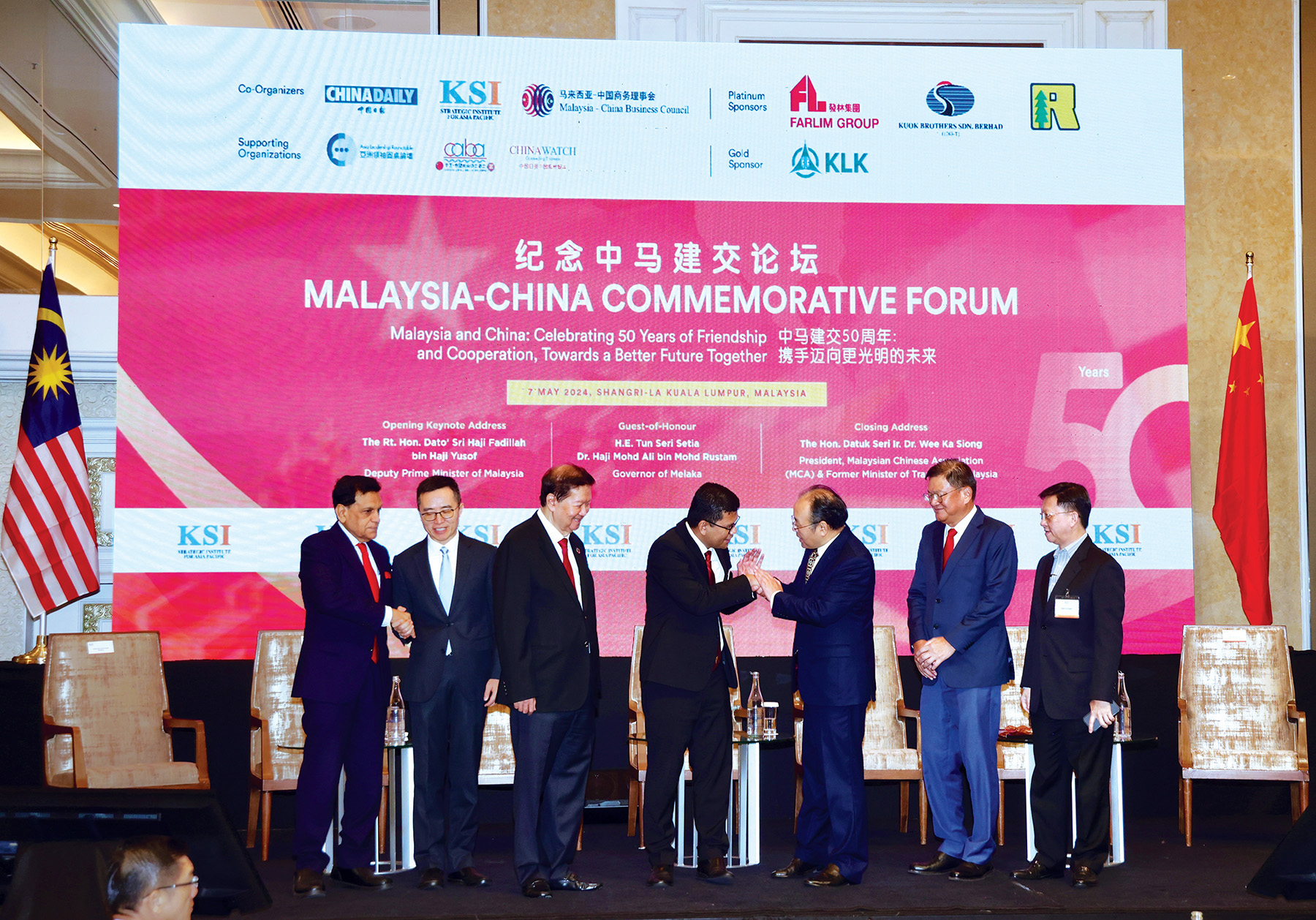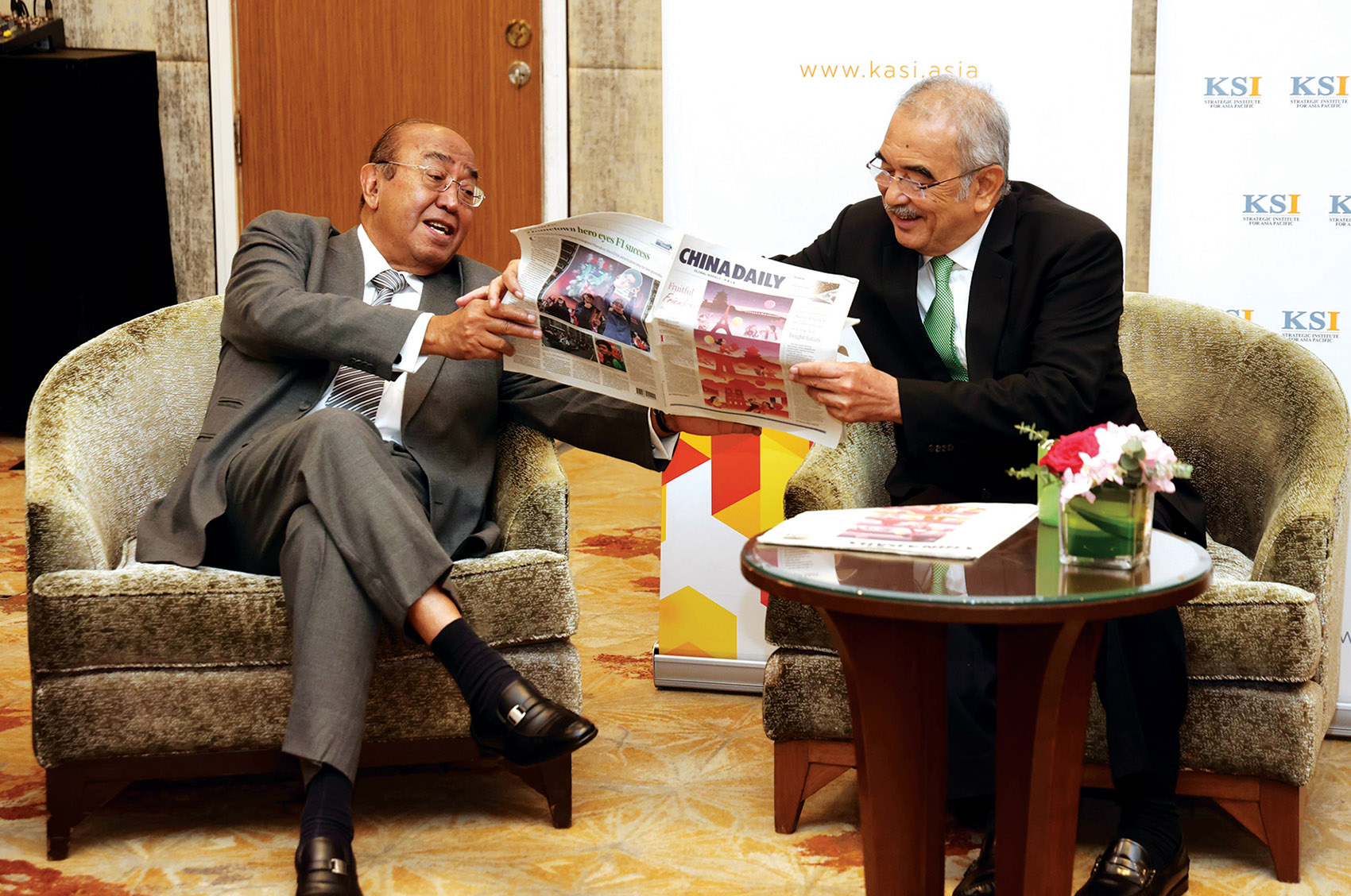Amid 50th anniversary of diplomatic relations, forum evaluates gains made so far, discusses the way forward

High hopes for stronger China-Malaysia cooperation were expressed on May 7 as government officials, industry leaders and academic experts gathered in Kuala Lumpur to commemorate the 50th anniversary of bilateral ties.
Zhang Fupeng, vice-president of Huawei Asia Pacific, said the Chinese tech giant is working with more than 1,000 partners in Malaysia to provide localized solutions to enhance connectivity and accelerate digitalization.
There are also talent programs for Malaysian students to adapt to digital innovation, said Zhang, during a panel discussion on “Working Together for Green Growth and Digital Economy” at the Malaysia-China Commemorative Forum.
As China and Malaysia will mark 50 years of diplomatic relations on May 31, China Daily — together with the Kuala Lumpur-based think tank KSI Strategic Institute for Asia Pacific, and the Malaysia-China Business Council — organized the Malaysia-China Commemorative Forum. The event brought together more than 200 delegates to evaluate past accomplishments and explore future direction.
During the forum, Ouyang Yujing, Chinese ambassador to Malaysia, said the mutual visa-free entry policy implemented at the end of last year has seen the number of Chinese tourists to Malaysia exceeding 270,000 monthly.
During the recent five-day International Workers’ Day holidays alone, the number of visitors from the Chinese mainland to Malaysia surged by more than 80 percent, he said.
“Another good news … Chinese President Xi Jinping announced in France (on May 6) that the visa-free policy for citizens from 12 countries, including Malaysia, to come to China will be extended until the end of 2025,” said Ouyang, as the audience broke into loud applause.
“Today, we are delighted to see that the development of electric vehicles is becoming a major trend,” said Liu Xueliang, general manager of Chinese EV maker BYD’s Asia Pacific auto sales division and president of BYD Japan.
BYD officially entered the Malaysian market at the end of 2022. The company already accounts for more than 40 percent of the local EV market, with total orders exceeding 10,000 units, Liu said.
Matthew Chen, CEO of OneConnect Financial Technology, said the company is working to build a digital trade corridor to connect companies — especially small and medium-sized enterprises that usually face difficulty getting loans — in China and other countries involved in the Belt and Road Initiative.
The fintech firm is an associate of Ping An Insurance (Group) Company of China, one of the largest financial services companies in the world.
Chin Chee Seong, secretary-general of the SME Association of Malaysia, said Malaysia and China have a lot of potential for cooperation in the green and digital economies.
He added that he hopes Chinese companies can enable more technology transfers to their Malaysian partners.
“Green nowadays is a matter of action,” said Albert Oung, president of the World Green Organisation, a Hong Kong-based nongovernmental organization.
Referring to regional initiatives such as the Asia-Pacific Green Deal and the ASEAN Green Deal, Oung said there is a need for a new way of doing business because the region does not lack technology but lacks ethical application that follows social justice.
Southeast Asia has seen tremendous growth in e-commerce in recent years but the region is still largely in development mode, so it is important to learn from China, said Sachin Sharma, co-founder and chief product officer of the financial services technology company Audax in Singapore.

Chin Yew Sin, president of the Global BRI Strategy Research Centre, said Malaysia can learn from China to advance infrastructure and make full use of digital technology, which will help the country be more competitive and attract more foreign investors.
At the forum, experts also shared their views on the topic “Driving Future Bilateral Partnership between Malaysia and China”.
“Partnership is always about people — how deeply we can communicate and how we can work together to build something,” said Nixie Lam Lam, a member of the Legislative Council of the Hong Kong Special Administrative Region.
Recalling her visit to Malaysia two years ago, Lam said she was impressed by the local students’ interest in Hong Kong television series, which inspired her to suggest to the HKSAR government that it should enhance youth exchanges.
It is people who make the economy work, so the governments of Malaysia and China should focus more on people-to-people exchanges, especially in the business sector, said Lee Kim Yew, founder of business conglomerate Country Heights and the first chairman of the Malaysia-China Business Council.
Noting that the policy transition of the United States in economic and political areas has created challenges for both China and Malaysia, Zhao Hai, director of International Political Studies at the National Institute for Global Strategy, said more investments from China are coming to Southeast Asia, including Malaysia, which is gradually forming a new network in the region.
Lee Heng Guie, executive director of the Malaysian think tank Social Economic Research Centre, said it is important for Malaysia and China to set new priorities to strengthen cooperation.
This includes deepening mutual trust, committing to free trade, exploring new opportunities in technology, and advancing high-quality Belt and Road cooperation, said Lee.
Joseph Adaikalam, founder and executive chairman of Binary University in Selangor state, said he hopes Malaysia and China can establish a joint ranking system for universities to further enhance exchanges in higher education.
“The key to China-Malaysia relations should lie in the continuation of cooperation between our two sides in various fields so as to ensure the sustained, healthy, and stable development of bilateral relations,” said Wang Dong, executive director of the Institute for Global Cooperation and Understanding, and full professor with tenure at the School of International Studies at Peking University in Beijing.
In a panel discussion on “Enhancing Malaysia-China Partnership Building for the Past 50 Years”, Wang said China and Malaysia share a similar view on many international and regional issues, and have made positive contributions to global peace and development by jointly upholding multilateralism.
Dominic Lee Tsz-king, a member of the Legislative Council of the HKSAR, said the city can support the China-Malaysia relationship through its strengths in financial and professional services.
Abdul Majid Ahmad Khan, Malaysia’s ambassador to China from 1998-2005, said Malaysia should actively participate and make good use of Chinese programs, such as the Belt and Road Initiative, the Global Development Initiative, the Global Civilization Initiative, and the Global Security Initiative.
Malaysia and China have been strengthening their relationship in a tangible way by turning policies into projects, said Koh Tsu Koon, chairman of the board of governors at Wawasan Open University, and former chief minister of northwest Malaysia’s Penang state.
In 1993, Penang became a sister city of Xiamen in South China’s Fujian province, and Koh said the agreement catalyzed business exchanges and created benefits for the local communities on both sides.
“The prospects for developing the Malaysia-China partnership are very bright,” said KS Nathan, a senior research fellow at the Asia-Europe Institute at the University of Malaya, a public university in Kuala Lumpur.
Oh Ei Sun, senior adviser of the Singapore Institute for International Affairs, said policy communication between Malaysia and China is important for economic development and avoiding the escalation of potential conflicts.


